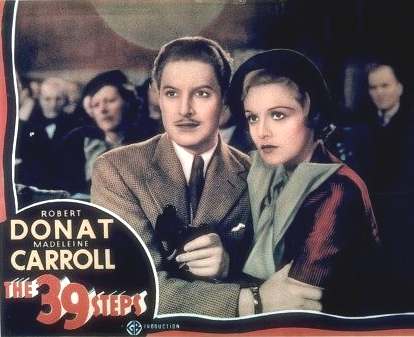
It so happens that this is the earliest Hitchcock movie I've seen--Juno and the Paycock, the Manxman, and The Mountain Eagle; they may be masterpieces all, but they will probably remain unseen by me. Early though it is, watching it I am completely convinced by the Auteur Theory. Nearly every scene bears the Hitchcock stamp: blondes, trains, the Macguffin, a meet-cute (R. Ebert), the strange genre of the spy-thriller/comedy, the open secret protected by the (in)attention of a crowd, etc.
Hitchcock occupies a strange place in the canon of "old films that most people have seen and liked"-- remarkable because of how many of his films are regarded as classics by an undiscerning public (eight or so), how entirely suitable for every taste they seem to be, and how continually ahead-of-their-time they seem to be. That all sounds very banal, but I dare anyone to think of another director so... so very popular! with everyone! The only possible rival is of course Howard Hawks, but Bringing Up Baby, The Big Sleep, Rio Bravo, To Have and Have Not, and Sergeant York don't hang together at all in the same way as Hitch's ouevre.
The 39 Steps is a great Hitchcock film. I prefer it to Spellbound, The Man Who Knew Too Much, The Birds, and Rope (to name only the duds among his famous movies). The pacing is flawless, the leads are likable, and there are five or six indelible shots (in a movie that is extremely "light" and not at all striving for indelibility). Mr. Strick and I will often mention Howard Hawks' definition of a good movie as "three great scenes and no bad ones"-- The 39 Steps has a dozen great scenes, easy.
On the back of my copy of Tolkien's Fellowship of the Ring, there is a blurb by W.H. Auden comparing it to The 39 Steps, the novel by John Buchan, "on the primitive level of wanting to know what happens next," in which I suppose these works are supreme. But Hitchcock's vision is immeasurably more profound than the good-evil world of Middle Earth: the world of this film is populated with indifferent, newspaper reading persons, who find it hard to believe anything outside of their routine gossip, who can barely be bothered to interfere in a matter of the greatest national importance. In short, a world of idiots. All of the intrigue which fascinates us, barely arouses any attention from the bumbling background of human life, which at most aspires to a local nosiness.
Perhaps one doesn't think this while watching the film, but what occurs to me while reflecting upon it is, "how unfortunate that the character cannot go back through every location, after it's all over and done with, and find everyone whom he had to evade or deceive, and let them know that they had been wrong and/or simply in the way!"
No comments:
Post a Comment